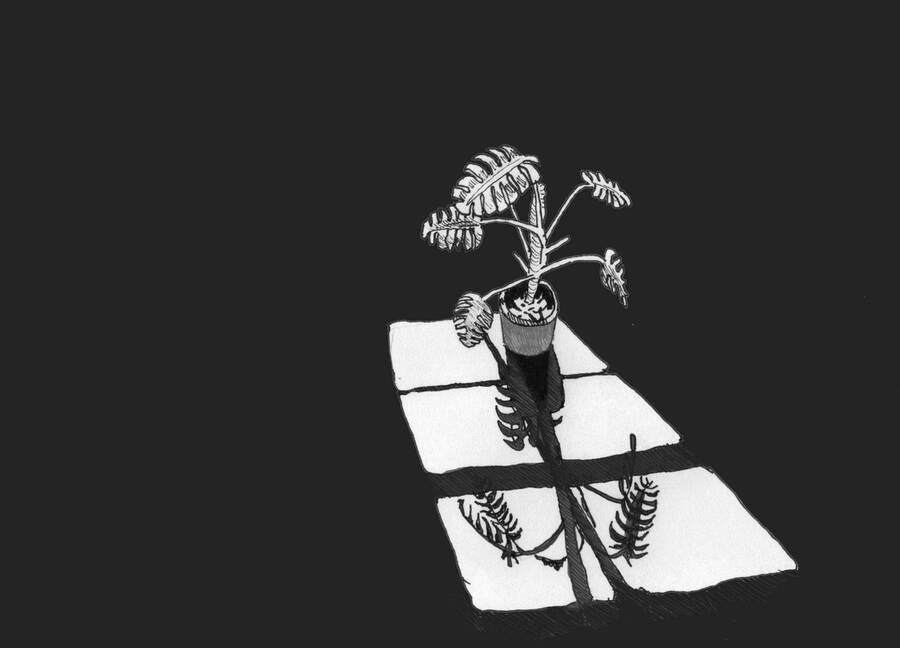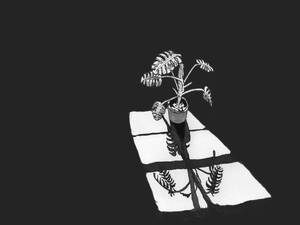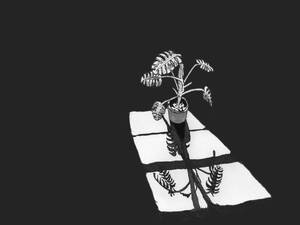Provisions #6: “In the exhalations of Americans there is a crumbling empire”
Meditations in a crisis on poems by Lucille Clifton, Mark Doty, and Etel Adnan.

In “Provisions,” three poetry readers reflect on a poem they’ve been holding close during this difficult time.
AS MANY COMMUNITIES ARE RISING UP to challenge the social and political conditions of Black people in the United States and around the world, I have been thinking about a sequence of poems by Lucille Clifton that appeared in her first book, Good Times. I say “sequence,” though it isn’t marked that way; the nine poems just appear one after the other. In the voices of two boys—tyrone and willie b (Clifton rarely uses capitalization in the text of her poems)—Clifton recounts riots and looting that took place in Buffalo, NY, during the summer of 1967. That was the so-called “long, hot summer,” when, in response to the economic and political disenfranchisement of Black communities, hundreds of riots erupted in urban centers across the country. By writing in persona, Clifton vigorously forgoes any claim to objectivity. Moreover, she emphasizes the embodied experience of political action by choosing for her personae not adults—who might have understood the sociopolitical factors that gave rise to the riots, or their place in the larger movement for civil rights—but rather two boys.
Each boy speaks four times. It is not clear whether they ever interact with each other, nor how or if they are related. Each speaks to a different way of experiencing the uprisings: While tyrone is among friends and comrades, and his experience seems to be mainly one of companionship and community—“we happy together oh / we turning each other on / in this damn war”—willie b is on an internal journey. Not only is he mostly physically alone (for example, absent the helping hands of a friend or comrade, he brings his wagon along to try to loot a TV out of a smashed store window), but his dialogue is internal, his concerns personal. The two characters’ musings intersect briefly when the governor of New York dispatches baseball hero Jackie Robinson, who integrated the major leagues, to try to cool tempers. Tyrone dismisses Robinson’s accomplishments as irrelevant (“if we buffalo soldiers was sports fans / we sure would cheer) while willie b, being younger, doesn’t even know of Robinson. Willie b’s hero is Muhammad Ali, who, in 1967, was a subversive anti-war, anti-government figure, an admirer of Malcolm X, a member of the Nation of Islam and a proponent of Black Power—a very different kind of role model to invoke during a race riot.
Each boy’s sequence ends with his own declaration of personhood. Tyrone is caught out in the riots by the police. We do not know his fate, but as the poem ends, he is being tear-gassed and his eyes are burning. Here, in the closing lines of “tyrone (4),” is a rare instance in which Clifton deploys capitalization: “they see the tear gas / burn my buffalo soldiers eyes / they got to say / Look yonder / Tyrone / Is.” At the end of this sequence, in a moment of severe degradation, capitalization—of “Look,” which supplants the passive “see” and demands the reader’s engagement; of Tyrone’s name; and, finally, of the verb signifying existence—powerfully asserts Tyrone’s subjectivity and personhood.
Willie b’s final poem ends with a similar move, as well as an admission that he participated in the destruction by arson of a local business, “the dew drop inn.” After telling us that his mother once picked up a white man there, he says, “look I am the one what burned down the dew drop inn / everybody say i’m a big boy for my age / me / willie b / son.” Clifton uses the line break here practically as punctuation. Where his mother earlier insisted that he had no business out in the riots because his father (“the mother fucker,” willie b calls him, at once description and rebuke) was white, the “me” and the “son” on their own lines foreground willie b’s claim to independence as a Black child.
In these eight sparse poems, Clifton creates an epic. There is no epic conclusion to this summer of resistance, though. The sequence ends with a final short poem, called “buffalo war,” which denies any sense of victory or accomplishment in the so-called war:
war over
everybody gone home
nobody dead
everybody dying
—Kazim Ali
EVERY MONDAY AT 9:30 PM, I have a poetry chavruta with my adopted zaydee, Leslie. When we began our chavruta two years ago, Leslie—whom I first met when I enrolled in his literature seminar in college—was planning a class on the elegy and proposed that we devote our studies to the form. I agreed, and we’ve more or less stayed true to course. In early March, after spending three months with Jericho Brown’s The Tradition, we turned to the work of Mark Doty. Though Doty looms large in the canon of AIDS literature, I’d read him only sporadically, and I hoped his work could provide tools, in our new coronavirus reality, for understanding viral epidemics and their accompanying mass loss of life. We decided to study Atlantis, the 1995 collection Doty wrote following his lover’s death due to AIDS-related complications.
Our first session on Doty took place in my first week of working from home in Durham, North Carolina, and of Leslie teaching via Zoom in New Haven, Connecticut. Although we’d always conducted our chavruta on video calls, it felt strange, after a day of work meetings, to again use the medium for social reasons. Even beyond this, I felt an uncomfortable presence hovering over our conversation, which only intensified in the following weeks as the coronavirus death toll rose. Leslie’s wife Susan has lived with Alzheimer’s for years, and she remains alive because of Leslie’s devotion and the support of a team of at-home caretakers. But now what saves Susan’s life doubles as a threat: Not only is each caretaker a potential risk of infection for Susan and for Leslie—who himself is a diabetic in his mid-seventies—but both Susan and Leslie, in turn, present a risk to the caretakers’ health. As the weeks passed, I’d hold my breath as the video call loaded, anxiously waiting for Leslie to report that everyone was “all clear.”
A month into Atlantis, Leslie and I read what is now my favorite poem in the collection, “Wreck.” The wreck in question is a beached fishing trawler, long abandoned on the Provincetown shore. The poem, which opens with the trawler’s description, moves swiftly into a meditation on decay and permanence:
something must hold,
some chambered wreck
must fill and empty daily,
seawater pouring like the future
—I need this evidence—
When we read the poem, Leslie and I were both taken by the line “—I need this evidence—,” whose em-dashes provide, through their exclamatory insistence, a sense of desperation as the poem comes to a close. And like any good chavruta, Leslie and I offered divergent readings.
I read the line as emanating from the speaker’s ongoing wreck: the death of a lover, the destruction of a community, and a gnawing doubt about the possibility of a future. I heard the desperation in the line as a plea—or a prayer—for evidence that a stable future would one day supplant the speaker’s loss-saturated present. Leslie, ever the optimist, read the line as arriving from that very future, where the speaker now reflects on the metaphorical wreck after the storm has passed. In Leslie’s reading, the future is guaranteed, and the evidence that the trawler provides is that life can and will go on—altered, but a life nonetheless.
Three months into quarantine, I continue to worry about Leslie, and I still wait anxiously, each week, to hear him report his “all clear.” And in the past two months, as the death toll has reached a number I find nearly impossible to comprehend, I haven’t changed my mind about my reading. But if Leslie’s optimism has taught me anything, it’s that I can find comfort in my interpretation, while also praying for the day when I can read, with him and with all those I love, his version of Doty’s line.
—Joshua Gutterman Tranen
LATE IN THE AFTERNOON on Wednesday, June 10th, in Miami, I watched as someone sprayed red paint across a stone face, a statue of Christopher Columbus—the man who, in 1492, was offered patronage by Spanish royalty, commissioned to discover a new path to India to expand access to trade routes. His fanatic dreams of a return to the Roman empire fueled mass enslavement and the near-extinction of Indigenous peoples in the Carribean, while his journey accelerated a global shift toward Christian European hegemony, an epoch of colonial profit and domination we continue to suffer under. More than 500 years later, I observed in awe and quiet admiration as a hammer and sickle and “George Floyd” were left emblazoned on the statue of the deranged Italian colonizer who raped a “New World” into order. George Floyd was lynched less than a month ago—a cop kneeling on his neck for nearly 10 minutes while others looked on.
Shortly after, police rushed the crowd, drove over the limbs of people—some as young as 18—and took protesters into custody, where the police interrogated them repeatedly and locked them in cold holding cells for 12 to 14 hours. These protestors, the police claimed in a press release, were “violent.” Later, City Council members, mainstream media outlets, and the mayor all called the protestors “violent,” too.
Violence, in the rhetoric of a police force defending the interests and sensibilities of the ruling class, often obscures so thoroughly, one might not note the blood in the soil, the blood in the water, the atmospheric brutality that enables America. Decolonial violence, in contrast with the continuum of colonial state violence in the shadow of 1492, dramatically, undeniably, upends the world order that Columbus’s vision forecasted—leading to what Frantz Fanon called “the creation of new men.”
When someone tears down a monument to Columbus—or when colonized and enslaved people cut the necks of the white masters who believed their power to be sacred and ordained—they demonstrate that white supremacy is not an impenetrable force. The chaotic periods of decolonial violence, then, are useful, a “cleansing” weapon of the terrorized. A righteous incoherency.
This is to say, to abhor and condemn violence without regard to who wields it, and to what end—to refuse to distinguish between destruction of property and a knee on a neck—is to deny the existence of totalizing violence in the world as is, and to be dishonest about what will be required in order to make the world anew.
Few poets capture the visceral and stunning contradictions of violence better than Etel Adnan. I return often to her epic poem The Arab Apocalypse in particular. Originally published in French and translated into English in 1989 by Adnan, The Arab Apocalypse is part surrealist manifesto, part text of witness to the horrors of war in Lebanon. Adnan does not search for innocence, nationalism, or coherence. Rather, in the rubble of Arabs killing other Arabs, in the rubble of Israeli forces bombing and arming Arabs killing other Arabs to undermine Palestinian resistance, in the rubble of massacres and self-defense, she forges a new language:
In the dark irritation of the eyes there is a snake hiding
In the exhalations of Americans there is a crumbling empire
In the foul waters of the rivers there are Palestinians
OUT OUT of its borders pain has a leash on its neck
In the wheat stalks there are insects vaccinated against bread
In the Arabian boats there are sharks shaken with laughter
In the camel’s belly there are blind highways
OUT OUT of TIME there is spring’s shattered hope
In the deluge on our plains there are no rains but stones
The violence of modernity, the violence of capitalist production and primitive accumulation, the violence of alliances with imperial actors at the expense of kinship: All harrow and inform the contemporary incidents of Adnan’s Apocalypse—these parameters, these harms, this context cannot be wished away.
Adnan’s naming of a crumbling American empire, hundreds of years of pain held back on a leash, feels particularly visceral here and now. There are so many pains to name; subdued for the mythology of a nation. But the leash grows thinner. “OUT OUT,” Adnan commands in grief. OUT OUT. Instructions to escape, or a premonition of violent endings before the new can begin. Whether or not the new will begin—and whose rubric of new it will be—will depend on the people. I hope for the children who pick up the stones and throw them at tanks, until the rains come.
In a time of uprising, the rebel poets must cultivate a righteous and meditative incoherency. Not in the legible institutions that insist we neatly describe our subjective diversity allotment. Not in the academy of flammable contracts. But with the people, in all their obscene contradictions, fumbling toward an otherwise, in and out of the streets.
—Zaina Alsous
Joshua Gutterman Tranen is a Jewish queer writer based out of Durham, North Carolina. He is an assistant editor in book acquisitions at Duke University Press.
Zaina Alsous works in the labor movement in South Florida and is the author of the poetry collection A Theory of Birds.



